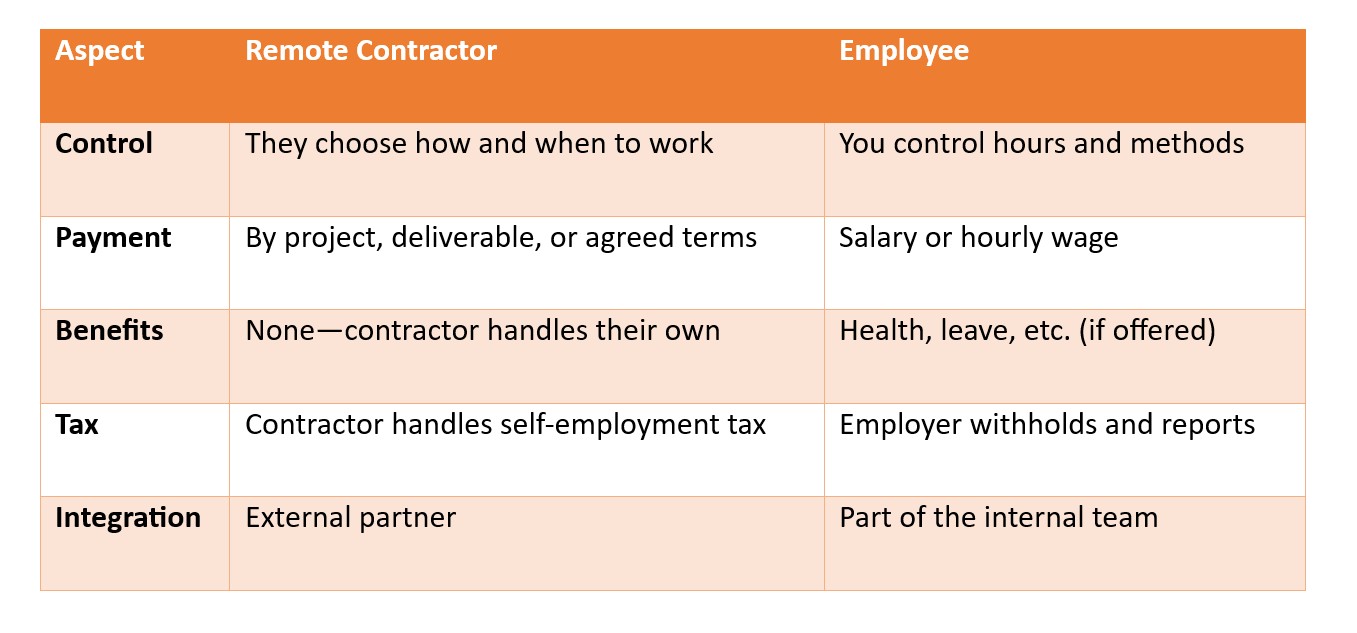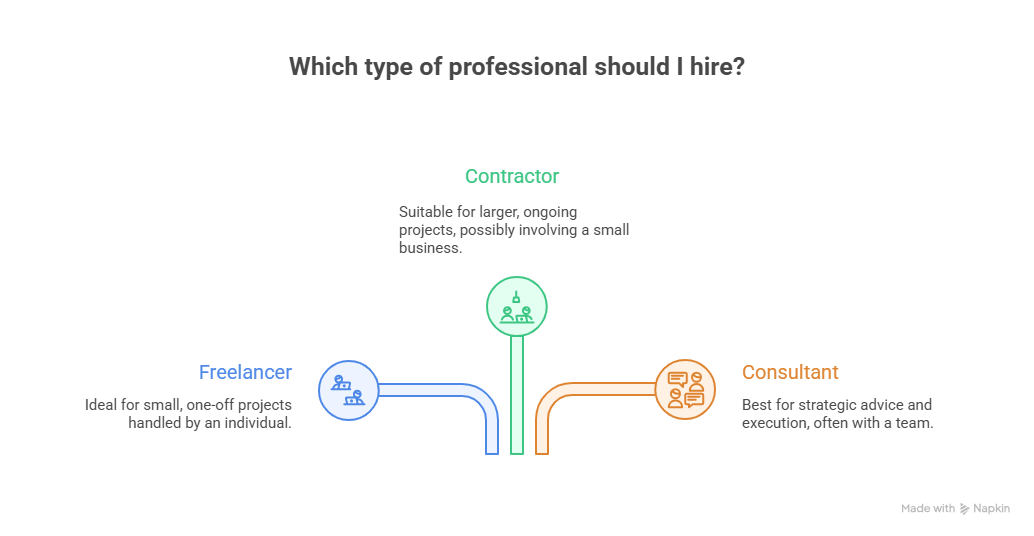If you’ve been exploring flexible hiring options, you’ve probably come across the term remote contractor. At first glance, it sounds simple: someone who works for you from another location. But there’s more to it. A remote contractor isn’t just a freelancer you find online or an employee who happens to work from home. It’s a specific type of working relationship, one that blends flexibility with professional independence.
This guide breaks it down clearly: what a remote contractor is, how they differ from employees and freelancers, and when it makes sense to hire one.
The simple definition
A remote contractor is a self-employed professional you hire to deliver a specific outcome, not to fill a fixed role in your organization. They:
- Work outside your physical office (and often, outside your country)
- Set their own schedule and methods
- Get paid based on an invoice, not through payroll
- Own their business status, they handle their own taxes, insurance, and benefits
Think of it this way: you’re not their boss, you’re their client. They’re not selling hours—they’re selling results.
Remote contractor vs. employee
This is where a lot of businesses trip up, and sometimes even get into legal trouble. The key differences are control and integration.

If you’re telling someone what hours to work, which tools to use, and how to do the job, chances are you’re treating them like an employee—no matter what the contract says. That’s where misclassification risk comes in.
Remote contractor vs. freelancer vs. consultant
The terms often overlap, but here’s a simple way to think about it:
- Freelancer: usually an individual, often handling smaller, one-off projects.
- Contractor: can be an individual or a small business, often on bigger or ongoing projects.
- Consultant: more focused on strategy or advice, sometimes with a team to handle execution.
The title doesn’t matter as much as the structure of the working relationship.

When hiring a remote contractor makes sense
You don’t need a full-time headcount for every role. Here are moments when a contractor is a perfect fit:
- You need specialized expertise for a fixed period.
- The work is project-based with clear deliverables.
- You want to scale up or down quickly without long-term commitments.
- Your budget fits a fixed project fee better than ongoing payroll.
- You’re testing a new market, product, or service before committing to permanent hires.
For example, if you’re launching a product and need a developer for six months, or you want a marketing expert to handle a campaign, a contractor gives you that flexibility.
The compliance piece
Each country has its own rules for contractors. Most look at control and independence. If you dictate the details of how the work gets done, the person is likely an employee in the eyes of the law.
In the U.S., for instance, the IRS uses a “common-law” test, and the Department of Labor has strict rules. In the UK, IR35 regulations apply. Other countries have their own variations.
If you’re hiring internationally, it’s smart to:
- Check local regulations (or use a compliance platform like Arbonum)
- Get a written contract that clearly states the independent nature of the work
- Keep records of invoices and communications in case you need to prove the relationship
How the relationship works day-to-day
Hiring a contractor doesn’t mean chaos. The relationship can be structured and predictable if you set it up well:
- Agree on scope, timeline, and deliverables upfront.
- Use collaboration tools like Slack, Notion, or Asana to keep communication clear.
- Schedule regular check-ins, but respect that they set their own working hours.
- Pay invoices promptly to maintain a healthy partnership.
Think of it as a client-vendor relationship rather than a manager-employee one.
Why remote contractors are becoming the norm
Businesses want flexibility. Talent wants autonomy. Technology makes global collaboration easy. The result? Remote contracting is no longer a niche—it’s how a growing share of the world works.
For startups, contractors help you move fast without heavy overhead. For bigger companies, they provide access to specialized skills that would be expensive or slow to hire in-house. And for the contractors, it’s a way to build a business on their own terms.
Final thoughts
A remote contractor is more than just someone working from a laptop in another country. They’re an independent partner helping your business achieve a defined goal. When you set the relationship up correctly, with clear boundaries, compliance in mind, and mutual respect—it’s a model that can save money, speed up execution, and give you access to talent anywhere in the world.
Whether you call them a contractor, freelancer, or consultant, the real question is: Are you ready to manage the relationship as a partnership? Because that’s when the model works best.




